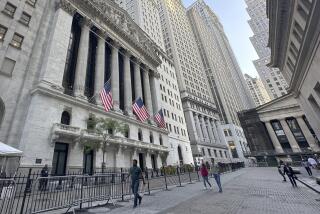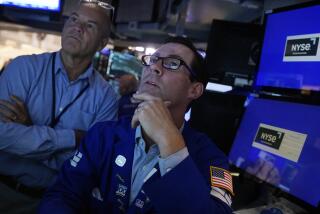News from U.S. hits globe’s stocks
Stocks dropped worldwide Monday as investors fretted about the dollar’s continuing fall and questioned whether the Federal Reserve’s cut in lending rates and the buyout of Wall Street brokerage Bear Stearns Cos. would avert a global financial calamity.
The dollar continued its slide when Asian markets opened Tuesday, falling below 97 Japanese yen in early trading as speculators anticipated another cut in the Fed’s primary lending rate. On Monday, the dollar had nose-dived as far as 95.72, its lowest level since 1995, and closed at 98.04.
But the yen’s sudden climb against the dollar has thrown profit projections awry for Japan’s export-dependent economy, the second largest in the world. That sent stock values tumbling on Asian markets Monday. The Nikkei 225 Index was down 3.7%; it is down 23% since the beginning of the year.
Many global markets matched Japan’s drop. Hong Kong’s Hang Seng index fell 5.2%, and the CSI 300 index that tracks stocks in the Shanghai and Shenzhen exchanges fell 4.6%. European markets were also down: London’s FTSE-100 was down 3.8%; Frankfurt’s DAX fell 4.2% and Paris shares, on the CAC-40, were down 3.5%.
Asian investors interpreted the Fed’s actions as further evidence of the depth of the U.S. economic retreat and global credit problems.
“Now Japanese investors completely lost confidence. They’re more like jellyfish, just floating around,” said Atsuo Mihara, an independent economist in Tokyo.
One Tokyo trader said he hadn’t seen such turmoil in Japan’s markets since 1997’s Asian financial crisis. The fire-sale price of Bear Stearns was spooking the markets, he said. “If it’s discounted extremely like this, it’s like the end of the world.”
For Japan, a higher yen takes a chunk out of profit for companies such as Sony Corp. and Toyota Motor Corp. that sell heavily to U.S. consumers. Most Japanese firms had issued profit forecasts based on a weaker yen, and the currency’s rise has led several to warn of sharply lower results. Sony has said it loses $62 million in operating profit for every 1 yen gain against the dollar. The company’s shares were off 5.7% on Monday.
Japan’s worries were compounded by a political deadlock over a new governor for its central bank. Toshihiko Fukui’s term expires Wednesday, and the main opposition party that controls Japan’s upper house has blocked the government’s proposed replacement on the principle that the next Bank of Japan governor must be free from political interference.
Many observers worry that the lack of clear leadership signals disarray in Japanese policymaking and may impede the Bank of Japan’s ability to coordinate monetary policy with other central banks. Japanese politicians expressed concern about the speed of the dollar’s decline, but so far the Bank of Japan has not indicated it is prepared to intervene in currency markets to drive the yen back down.
--
British blues
In Europe, the euro rose to a record $1.59 on Monday before finishing at $1.5731, up from $1.567 on Friday. That, combined with a reluctance among banks to lend to one another, continues to generate worry. The Bank of England stepped in Monday with a $10-billion injection of credit to ease the still-tightening market for interbank lending, and it was quickly oversubscribed by a factor of five.
British Prime Minister Gordon Brown told Parliament: “While our economy is resilient and the fundamentals strong, we will . . . continue to take whatever action is necessary to maintain economic stability.”
The City -- London’s equivalent of Wall Street -- has been hit hard by the U.S. credit crisis touched off by sub-prime mortgages. The Centre for Economic Business Research in London estimates the turmoil will lead to the loss of 10,000 jobs in the City this year.
“The major players in the UK financial market are essentially American banks,” said Jonathan Said, senior economist at the research group. “And it’s not just American banks -- we’ve seen a number of big European banks that have been exposed to the [credit crunch]. And what’s happened to Bear Stearns has just raised investors’ doubts about the liquidity risks that banks have.”
The expanding job losses are a direct result of shrinking credit, he said. “Private equity hedge funds . . . are very dependent on being able to access finance, and if that finance is not there to be accessed, they have much less business to be done, and that’s where we see the jobs start to go.”
In China, meanwhile, investors are wondering whether the government will intercede to stop the markets’ decline. Shanghai’s composite index has fallen from a peak surpassing 6,000 in October to 3,820.
“I never thought that it would fall this much before the Olympics” this summer in Beijing, said Hong Ya, a 24-year-old homemaker whose family’s stock portfolio has lost about $100,000 in value in recent months. “Everyone was saying that before the Olympics it wouldn’t fall, but keep rising. Of course I hope the government will do something to save the market.”
Although China regulates its currency exchange rate and has been somewhat insulated from the dollar’s drop, Chinese stocks have been hurt by the slowing U.S. economy. There are already signs of softening Chinese exports to the U.S.
--
Chinese inflation
But perhaps the biggest culprit in China’s stock woes is inflation. Consumer prices are up more than 8% this year, and the government has responded by tightening lending by banks. That’s pushed more companies to seek funds from the stock market by issuing new shares. At the same time, once-non-tradable shares have flooded into the market after a ban was voided.
“The lifting of the restriction started in the second half of last year, but when the market was doing well, it wasn’t so obvious,” said Zhang Qi, an analyst at Haitong Securities in Shanghai. “These days, more and more are selling . . . and under such increases, the [prices] in the market can’t be sustained.”
Many investors and some analysts still expect Beijing to prop up the market, lest it risk the ire of millions of ordinary Chinese who have plowed their savings and retirement funds into stocks. The government has taken steps to control new share issues, and it could lower the stock stamp tax (a fee for stock transactions).
But most analysts don’t think such measures will bring about a reversal of fortune. Shanghai economist Andy Xie says Chinese stocks are still too expensive. He cited PetroChina Co. as an example. Its shares closed Monday at $1.21 in Hong Kong trading. The price for the same stock traded in Shanghai: $3.19.
Xie noted, though, that overall trading volume has been low recently, indicating there’s no widespread panic.
“We still have a lot of people holding on and hoping that the government will bail them out before the Olympics,” he said.
Xie reckons that the bottom of the market may not come until the bulk of the young, white-collar investors who entered the market in 2006 -- and thus are still in the black -- head for the exits.
Hong, the homemaker, said she wasn’t taking her money out. “Now people are saying that it won’t be until June, [two months] before the Olympics, that the market starts to come back up a little,” she said. “All my friends and I, we all feel dizzy these days. Most of us entered the market around 2006 and have tasted some sweetness. Now we are all deeply trapped.”
--
bruce.wallace@latimes.com
Wallace reported from Tokyo and Lee from Shanghai.
Times staff writer Kim Murphy in London contributed to this report.
More to Read
Inside the business of entertainment
The Wide Shot brings you news, analysis and insights on everything from streaming wars to production — and what it all means for the future.
You may occasionally receive promotional content from the Los Angeles Times.











